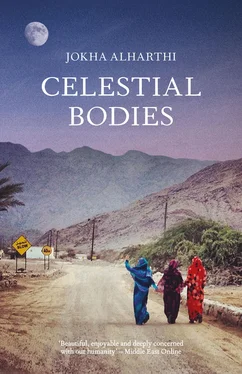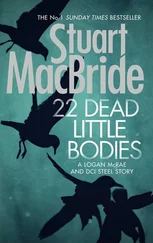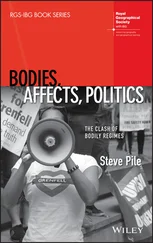Now, Asma lowered her eyes to stare at her stomach, flat and taut in the mirror. She couldn’t keep back a grin as she imagined it rounding out. And then, as soon as it was vacated, she hoped, it would grow big and round again. She didn’t have a specific number of children in mind — it was hard to imagine any of this, really — but she could see herself vaguely as an old woman standing beside an aged Khalid as dozens of sons and daughters and grandchildren gathered around them.
She looked the mirror-figure in the eye, and both of them shivered. It was the thought that she was about to join the other half of her, the self which had been separated from her self ever since earliest creation. In her mind she recited that favourite passage of hers, describing how humans were only halves of a whole, long ago detached one from the other, and no half could be truly complete or at peace until it was united with its missing part. What was Khalid feeling right now? Was he as anxious as she was? Was he feeling happy? Oh! Despite all of these worried thoughts she could not wait for them to be together.
At sunset, women began to descend in groups on Salima’s house. They crowded around the huge platters of rice and meat, and the trays of fruit, that sat on cloths stretched across the courtyard. Singing and the sound of drums rose, and the circles of dancers expanded. Zarifa joined the group dancing the hambura. The bridegroom’s mother arrived with a group of kinswomen in tow, their gleeful shouts adding to the mayhem. We want our bride! Give us our bride! They didn’t tarry, turning immediately toward Asma, a seated silhouette draped in a green silk shawl. Salima helped her to her feet and hugged her before manoeuvering her arm into the grasp of the groom’s mother, who marched her proudly to the decked-out bright red Mercedes that was waiting at the door, Emigrant Issa himself at the wheel. All the women followed the procession out, climbing into the buses ordered specially for the wedding. They would follow the bridal car all the way to Muscat and the flat Khalid had rented as a bridal retreat, and their new home.
With the bridal procession’s departure a sudden stillness fell over the house, sending fear into Salima’s heart. She collapsed on the reception-room steps. Here was the second of her girls leaving the house, and this was the daughter who tried her tenderness the most. We raise them so that strangers can take them away, she whimpered. She left everything just as it was; in the morning, there would be people here to help her clean and put everything right. Now, though, everyone was caught up in the ongoing singing and dancing, first in the buses and then at the groom’s home. She wished she could be there when Khalid lifted the silk shawl from Asma’s face, but she respected the tradition that the mother of the bride does not go to the groom’s home on her daughter’s wedding day. In the middle room, where she had slept ever since Azzan abandoned her bed, she rolled out her bedding and lay down, still thinking about Asma, and suddenly overwhelmed, too, by memories of her own wedding and the day she was taken to Azzan’s home.
She was thirteen when her uncle Shaykh Said’s wife urged him in no uncertain terms to send her to her mother now. But only after his brother’s widow begged him one final time did Shaykh Said agree that Salima could live with her, on condition that Muaadh remained in his house. So Salima moved to her maternal uncle’s home, where she spent the loveliest years of her life, enjoying her mother’s warmth and her maternal uncle’s affection. Her mother’s brother had not been blessed with children and he welcomed her with open arms. His home was nicknamed Orchard House because it was a tangle of fruit trees and bushes — mango, lemon, orange, quince, jasmine, roses. The rooms had been built in a crescent shape to accommodate the trees. This small orchard was the centre of the house, its pivot onto which every room opened. The fresh, moist breezes that this unique building let in soon filled Salima’s spirit. She especially loved sinking her feet into the series of small canal-streams that kept the orchard watered, flowing into a larger underground channel that went on for several metres before pouring into al-Awafi’s main canal.
Salima’s rapture didn’t last long. Very soon her paternal uncle informed her mother that he was going to marry Salima to his kinsman Azzan, a green and heedless boy a few years her senior. Her mother was not keen on this marriage and her own brother took her side. They opposed this match strenuously and persistently, objecting on the grounds that Azzan was still a tender youth, and still a young apprentice-follower of Judge Yusuf’s. Moreover, they insisted, it was very possible that he would decide to follow the family members who had emigrated to Zanzibar, leaving his wife behind. But Shaykh Said put his foot down and warned Salima’s maternal uncle that if he didn’t open the gate to Orchard House to allow her to leave, he would get her out in his own way. Her mother’s brother felt his honour humiliated by this threat. He bolted the front gate.
On the day that Shaykh Said had set for the wedding Salima was eating the midday meal with her mother and uncle when, from the big canal in their orchard, swarmed a cluster of slaves, men and women, who belonged to Shaykh Said. Water dripping from their bodies, they formed a tight circle around the startled, and then terror-stricken, family. Salima had to go with them right now, they said. Otherwise they would have to take her by force, making her swim through the orchard canal to the main falaj outside. At that, her uncle opened the gate. The men and women who had invaded his home took Salima away, and a few hours later she became Azzan’s bride. People would go on calling her the Bride of the Falaj for years afterward. Many, very long, years afterward.
Why do people say my grandmother died bewitched? asked London.
Because that’s how they explained any death that happened suddenly and any illness they couldn’t explain, I responded.
Do you know what she was ill with, Papa? London asked intently.
I don’t know, I mumbled.
But I’m a doctor. So maybe I could figure it out. Did anyone tell you what her symptoms were, and how long she was sick?
Yes. People say she got sick very suddenly, two weeks after I was born. Her skin turned blue and her pupils contracted. She started sweating very heavily and she couldn’t stop shivering. People said the spirits were fighting it out with each other on her body and that’s why she was shaking so hard and giving off so much sweat. Then, they said, the strongest spirit won her from the others, and so she quieted down and got very cold. People assumed she had died so they buried her.
London’s face looked very pale. What’s wrong? I asked.
These symptoms are common to a number of illnesses but most likely they indicate poisoning, London said, her voice edgy. I remember what Gramma Salima told me, she said a lot of poisonous herbs, like habb al-muluk, and red and yellow dafla, grow in the desert around al-Awafi. She told me that sometimes women slipped traces of these into their co-wives’ food to make them ill. Then they’d have the husband to themselves.
I put my arm firmly around her shoulder. London! My mother didn’t have any co-wives.
She nodded her head. Yes, that’s true. Where was my grandfather at the time?
On a trip to Salalah for his trade. That’s why no one took her to Thomas, the American missionary who was famous because he treated people’s illnesses without taking any money. People lined up from dawn until late at night to see him.
It’s very odd, muttered London. They could be symptoms of another illness... maybe... who knows?
Читать дальше












